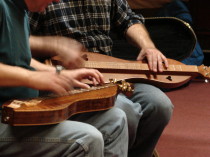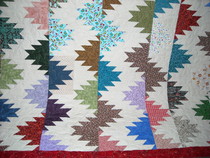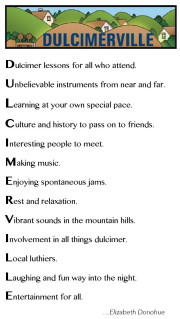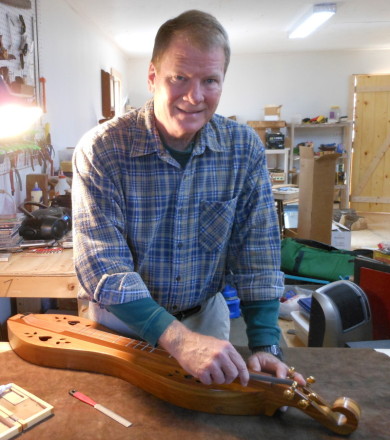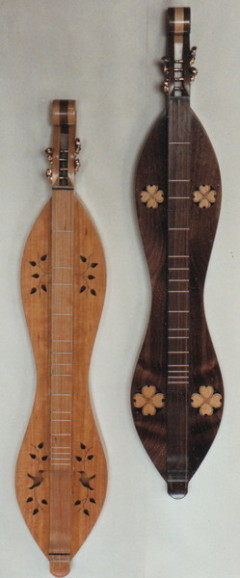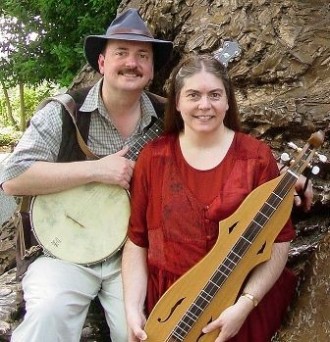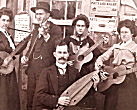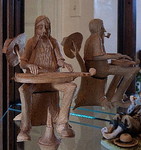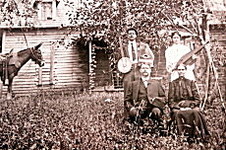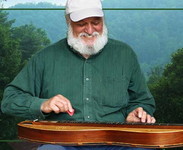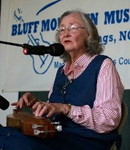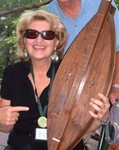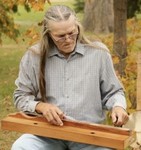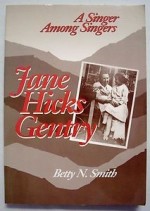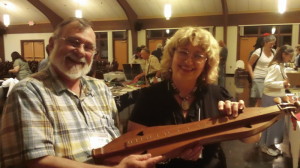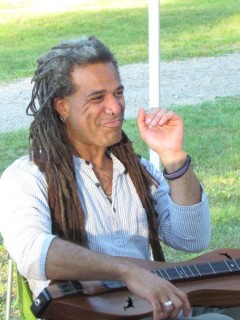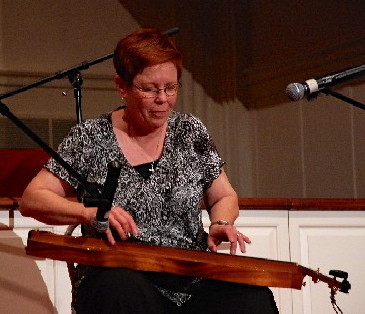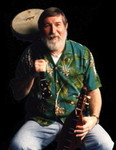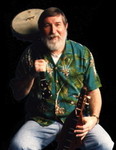
You can contact us here:
FROM A DULCIMERVILLE PARTICIPANT: "A great inexpensive vacation, and the bonus was I brought home the ability to enjoy music much more!"
SHARE A RIDE? If you are willing to share a ride (and expenses) to Dulcimerville or from area airports, some very nice dulcimer folks need a little help that way. Just email Lois Hornbostel if you can help.
Morning Courses:
If you have any questions about registering for your classes, etc., write an e-mail to Lois Hornbostel, including your telephone number and when you can be reached.
New This Year!
Mountain Dulcimer BUILDING
coming back to Dulcimerville!
Bill Taylor, Instructor.
PLEASE NOTE: This course has filled. We are keeping a "waiting list" in the event that a space becomes available. To get on the waiting list please write an e-mail to Loisdulc@frontier.com. Should an opening occur, we will contact people on the waiting list in the order that they wrote us.
Bill Taylor started building dulcimers in 1985 and has built over 1,600 in the time since. His instruments are known for their beauty, tone, volume and playability. This course will be limited to 8 students and will take place in both the a.m. and the p.m. class times. Each student will build a professional hourglass style dulcimer – Bill’s “Smoky Mountain” model. This is not a mass-produced kit you will be building. Just as all dulcimer players are different, their instruments are too, and Bill wants to offer options in terms of woods used and sound hole designs, so you can really make this dulcimer your own. They will be built of native hardwoods for the whole instrument, with an option of spruce or western cedar soundboard.
No woodworking experience is required, although basic knowledge of the use of common hand tools is helpful. All necessary tools will be provided. Out of necessity, some of the heavy tool cutting will have to be done by the instructor before the class starts, but there will be opportunities during “glue drying” time for demonstrations, so students will understand all aspects of building a dulcimer from start to finish. Those “glue drying” times will also allow the time to learn more about the science and craft behind creating a good sounding musical instrument, as well as other aspects of woodworking and applying finishes.
Students and teacher will be working both morning and afternoon sessions in order to finish the instruments and, as time permits, we will offer some dulcimer playing instruction at the end.
Students will be leaving at the end of the week with a brand new high-quality dulcimer, as well as the knowledge to go further with building if they want. In addition to the tuition for the week, which covers the five days of instruction and all the Dulcimerville activities after classes, the fee covering all the construction materials is $195, payable to Bill Taylor on the first day. (In addition to the skills you will learn, the base purchase price value of the dulcimer you take home would be $495.)
Things to bring from home: an expendable towel for a workshop cover, pencils and paper for taking notes and tracing patterns (optional).
PLEASE NOTE: This course has filled. We are keeping a "waiting list" in the event that a space becomes available. To get on the waiting list please write an e-mail to Loisdulc@frontier.com. Should an opening occur, we will contact people on the waiting list in the order that they wrote us.
To register for this class, please use the Participant Registration form on our REGISTRATION page. Just fill in your choice as "Dulcimer Building" and don't worry about choosing the electives classes. Attach a check or money order for the tuition and mail as described on the form. Since this is an intentionally small class, we expect it to fill soon, so it's good not to wait too long. For specific questions about the class and available sound hole and wood options contact Bill Taylor at: BT1478963@aol.com or at 865-384-8961 before 9:00 p.m. Eastern time.
Beginner/
Advanced Beginner
Playing Skills & Music
Heidi & John Cerrigione,
instructors.
(See STAFF page for bio.)
NEW THIS YEAR! This course offers the special flexibility of having two instructors, Heidi and John, who are amazing teachers! If you are a Brand-New Player with no experience, you will be nurtured in the basics of playing - and you will progress easily. If you already play some but would like to review the basics, build your skills and gain confidence as Advanced Beginners, John and Heidi will be able to thoroughly address your needs on your musical path. We will have two different rooms in which to work, depending on enrollment.
You will need a mountain dulcimer to play in class, but if you do not have one yet, check on your registration form that you would like to borrow a loaner dulcimer. This free, but we only have a limited number of “loaners.” There will also be excellent opportunities to try out dulcimers for purchase in our Dulcimerville Marketplace.
Course goals: To provide a relaxed environment for you to learn basic mountain dulcimer playing skills; to enjoy the music and interact with other dulcimer players; and to take home the ability to play and expand your repertoire.
Special feature: To strengthen and make the learning process easier for our newer players, after registration we mail a CD of the melodies to be learned in class. This will give you the opportunity at home to hum along to learn the melodies before you learn to play them in class on your dulcimer – strengthening your ability to play by ear.
Skills covered:
The parts of the dulcimer; how it works; and how to play comfortably.
Tuning the instrument (we will work in two tunings – DAA and DAD).
Basic left-hand fingering for efficiency of motion.
Right-hand strumming and use of different rhythms.
Learn to read dulcimer tablature (playing by fret numbers).
Learn to play by ear and skills for memorizing songs.
Extra coaching: On Tues., Wed. and Thurs. afternoons, we will offer coaching and practice guidance to players in this course as a choice before progressing on to the Special Subject Classes. We can address individual questions and provide specific suggestions to enhance your playing. We encourage you to take one of the easy Special Subject Classes on Fri. afternoon – or earlier if you’re ready. We also encourage all students to get together with classmates for practice after classes and to join in the easy evening jams.
Advanced Beginner students feel they are well into Advanced Beginner level have two excellent choices besides this class: The ’13 edition of Traditional Music for Mountain Dulcimer (team taught) or Early Intermediate Skills & Music with Bing Futch. Descriptions of both those courses are below.
2013 edition of
Traditional Music for the Mountain Dulcimer
Material and playing styles are flexible and Advanced Beginner thru Advanced students can comfortably play and adjust material to their individual level of challenge. Each year yields new “discoveries” of mountain dulcimer traditions and music we have not offered before.
Instructors, Left to Right: Don Pedi, Betty N. Smith, Lois Hornbostel, Ehukai Teves, and Randy Adams.
(See STAFF page for bios.)
This course focuses on traditional music and playing styles of the Southern Appalachian mountain dulcimer. The music is like “time travel” into the instrument’s past and into American history, consisting of Anglo-American ballads, dance tunes, traditional folk songs and Southern Appalachian hymns. We’re part of a historic chain when we learn and play the music of our dulcimer-playing predecessors, and many of them are represented in this course.
The accent of this 13-1/4-hr. course is on playing the music and learning traditional playing styles rather than on lengthy lectures. Our instructors will briefly present the “stories” behind the songs and information on the mountain dulcimer’s development by early player-builders. Much of this is colorfully featured in the ’13 version of Don Pedi’s slide show. You will learn to play approximately 20 pieces of music – mostly new pieces for 2013 for our returning students. Learning and playing by ear will be practiced in a relaxed, personal way, but dulcimer tablatures for the pieces will also be distributed. It is recommended that students bring an audio recording device to record music for future practice. The classroom environment will be non-competitive, sharing, and both the music and the dulcimer’s traditions will be savored. Each piece of music has its own “story.” Your teachers have accurately researched them and you’ll learn them with the music.
Traditional Playing Techniques Taught:
• Straightforward single-string, melody/drone style playing.
• Both noter style playing and simple finger noting as well - no complicated left-hand chord work.
• Right-hand will focus mainly on strummed style.
• Emphasis will be on developing clear, rhythmic playing.
• Basic traditional tunings (DAA, DAC, DAD) and DGD tuning for the key of G will be taught and used to bring out the dulcimer’s varied voices.
• Simple chords for accompanying singing.
• There will be music taught from paper, but true to tradition, there will be training in picking out music by ear and memorizing.
SCHEDULE for Traditional Music course (Tues. thru Sat. mornings. Enrollment is for all of the course sessions, not individually): Throughout the week a Slide Show and recordings of historic dulcimers, players and music with Don Pedi. 9:00a.m.-12:15 p.m. each morning (with coffee/tea break from 10:30-11:00):
Tuesday morning: Don Pedi will present his slide show and recordings of of historic mountain dulcimer players and instruments, and will teach playing techniques (using his left-hand finger style), and the class will learn music for Southern dance tunes, songs and hymns, along with characteristics of each music.
Wednesday morning: Betty N. Smith. Come and play and sing traditional ballads and false-true love songs that sound just right on the mountain dulcimer. This class will also help you "get to know" some of the early influential local folk musicians who handed down what we now play - many of whom Betty has known and learned directly from, like North Carolina's "Minstrel of the Southern Appalachians" Bascom Lamar Lunsford. Betty will also present music from balladeer Jane Hicks Gentry, the focal point of Betty's book A Singer Among Singers. Travel into their world - where they lived, learn how they looked, and become a part of the chain of musicians carrying on their music.
One of Betty Smith's students described her classes as follows: "I cannot imagine that there is another instructional experience like Betty Smith's class anywhere on the planet! From stories of Appalachian history, its people - their music and lives, ballads, poems - to technical playing details explained simply, Mrs. Smith enriched our experience beyond all expectations."
Thursday morning: Lois Hornbostel and Ehukai Teves.
In the early days at Dulcimerville's roots Lois Hornbostel directed the ASU Dulcimer Workshop in the '80s, where she became friends and learned from many of the historic Watauga County, NC dulcimer builder-players like Stanley Hicks, the Glenns, Nettie & Edd Presnell, Frank Proffitt, Jr., and Jacob Ray Melton from Galax, VA. Lois will teach you some of the music they played on their dulcimers.
Ehukai Teves learned much of his dulcimer music from his friend the great Jean Ritchie and will present some colorful, less-played songs from her repertoire.
Friday morning: Randy Adams will teach his unique noter style, using the noter on middle and bass strings, and how he plays fretless dulcimer, and the class will learn mostly old-time string band tunes and songs.
Saturday morning (10:45 a.m.-1:00 p.m., after General Closing Session & Coffee Break): Don Pedi
Do you have a historic/vintage mountain dulcimer to bring to class?
We invite you to bring it, tell what you know of its history, and if it is in playing condition, let us hear its voice. Please let moderator Don Pedi know in advance. donpedi@hotmail.com.
Early Intermediate
Playing Skills & Music
Bing Futch, instructor.
(See STAFF page for bio.)
Prerequisites: Early Intermediate players should be able to play at the level of an Advanced Beginner or above and be comfortable with tunes that have been memorized and played with assurance.
Goals & Skills: In the Early Intermediate sessions, we'll underscore fundamentals with basic music theory with an eye and ear towards becoming more "in touch" with the mountain dulcimer.
We'll begin with a focus on right-hand techniques involving strumming, pattern-picking and percussive playing.
Left-hand studies will include easy finger placement, chording and a variety of techniques like hammer-ons, pull-offs, vibrato, tremolo, bends, harmonics, slides and more.
We'll work through a wonderfully international selection of player-friendly music that will make exploring the mountain dulcimer terrain fun.
Although DAD will be our fundamental dulcimer tuning, this journey will involve playing in some different keys by retuning or using a capo. We’ll be doing some singing with the mountain dulcimer, and the ability to tune to your personal vocal range makes singing much more satisfying. We’ll also show you how to take a very basic dulcimer arrangement and expand it to a more entertaining version.
Lots of resources for soaking up and understanding music theory will be available, and we'll also learn the basics of how “making the music up as you go,” which will put you on the road to “improvisation.”
Extra coaching for members of this course is on Tuesday from 2-4 p.m. to help you settle in and know what to practice. This session is not mandatory if you’re ready for the many Special Subject afternoon classes aimed at Intermediate skill level. We also encourage all students to get together and play after classes.
Progressing Intermediate
Playing Skills & Music
Linda Brockinton, instructor.
(See STAFF page for bio.)
Prerequisites: If you believe you can play using the majority of skills outlined in Early Intermediate level course (see that description), you should be ready.
A note from Linda about her new Progressing Intermediate course:
“Hello Friends.
I am so thankful to be teaching at Dulcimerville again this year and can’t wait to see all my friends!
In this year’s course I want to focus more on teaching you to make your own tab or arrangements so you are not dependent on other peoples’ tablatures. We will use the DAD tuning on our dulcimers. We will, of course, use printed music to learn this process, but playing can be so much fun when you have acquired the skills to just sit down and play and not be burdened always with stands and books.
I will lead you through the process:
1. beginning with picking a song and finding its melody notes on the dulcimer’s fretboard,
2. finding the chord harmonies on the fretboard to combine with the melody notes,
3. choosing the right-hand playing style (either strummed or fingerpicked) that you like,
4. experimenting with different rhythms,
5. and polishing your playing of the tunes you arrange.
We will look at the technique of fingerpicking and how to come up with different picking patterns. Also if you have a playing partner or group we will learn lots of simple way to play with others.
You’ll be in a friendly atmosphere that will make you comfortable to challenge yourself and accomplish. You’ll get support from me and your classmates to help you build skills you’ll be proud of. As they say, “If you always do what you always did, you will always get what you always got.”
Hope to see you all there this year - I have lots of good stuff for us to dig into!
Linda”
Intermediate-into-Advanced
Playing Skills & Music
Neal Walters (left) & Stephen Seifert (right), instructors.
(See STAFF page for bios.)
Prerequisites & course structure: You have learned the majority of your Intermediate skills (See Intermediate course description.), and you are ready to learn from more than one artist's approach to playing, so we have recruited a dynamite team for you! Neal Walters, a very experienced musical performer and teacher with a delightful dulcimer playing style, will work with the class for the first half of the week (approx. 6-3/4 hrs.), and Stephen Seifert, one of the country’s best dulcimer players ever, will teach the second half of the week's lessons.
Course description: This comprehensive course is designed to help you empower your playing with stronger skills and to give your music more versatility, creativity and sparkle.
Neal Walters plans to teach our Intermediate-into-Advanced students the following in DAD tuning, with some flexibility after assessing student readiness and needs:
Chord Embellishment – We’ll demonstrate how “dress up” existing arrangements by incorporating various “color chords” through the use of chord substitution techniques.
Playing More Expressively – We’ll work on both left and right hand techniques that will add both smoothness and musical textures to your playing. These techniques include the use of things like slides, hammer-ons, pull-offs, flat-picking, vibrato, and dynamics.
Singing with the Dulcimer – We'll work on techniques for accompanying singing (or another lead instrument) with an eye towards complementing the vocal rather than competing with the vocal.
Repertoire building – New repertoire illustrating the above techniques will be pulled from a variety of genres, including old-time, traditional, Celtic, contemporary, and more.
Stephen Seifert plans this year to teach our Intermediate-into-Advanced students the following in DAD tuning, with some flexibility after assessing student readiness and needs:
NEW THIS YEAR!
Polishing your playing: Back when Steve was learning some of the more challenging standard dulcimer tunes, he developed several effective exercises that helped him meet the challenges that each of those tunes presented. As he continued learning, Steve found that these specific exercises also targeted playing challenges he encountered in later new tunes that came his way. Steve will share with you these valuable exercises, using two- to four-measure sections of familiar tunes that most of us find challenging. He will teach you these valuable exercises to help you play the music more masterfully and smoothly. Some of the specific skills covered will be:
. Graceful and efficient left-hand technique, using all the fingers of the left hand
. Clear hammer-ons, pull-offs and slides
. Smooth chord fingering to play chord-melody arrangements
. Right-hand techniques (strumming, flatpicking, fingerpicking)
NEW THIS YEAR!
Performing: Most dulcimer players of Intermediate-into-Advanced skill level find themselves called upon to perform their music for others. In the time that we have, Steve wants to show you how to “evolve” a piece you plan to perform. You’ll play through the basic melody first, next playing it with some added notes, then perhaps playing it even more simply for variety, then progressing to more embellishment as the piece “evolves.”
Advanced Playing Skills & Music
Stephen Seifert (left) & Neal Walters (right), instructors.
(See STAFF page for bios.)
PREREQUISITES & COURSE STRUCTURE: This one’s for the accomplished students who want to experience the different styles of these two outstanding musicians and to further develop a playing style of your own. You have learned the majority of your Intermediate-thru-Advanced skills (See Int.-into-Adv. Course description.). You are comfortable playing in some different keys, playing chords in various positions, and have experience playing melody notes using all three strings. It is important that you can play a number of tunes without tablature. You should be reasonably comfortable playing in front of others. Stephen Seifert, one of the country’s best dulcimer players ever, will work with the class for the first half of the week (approx. 6-3/4 hrs.), and Neal Walters, a very experienced musical performer and teacher with a delightful dulcimer playing style, will teach the second half of the week's lessons.
Course goals: With the solid mountain dulcimer playing skills you have attained, you are ready for more than one artist's approach to bring out the best in your playing, so we have recruited a dynamite team for you!
Stephen Seifert plans to teach our Advanced students the following in DAD tuning, with some flexibility after assessing student readiness and needs:
NEW THIS YEAR!
Spontaneous playing: Advanced level students generally have good playing technique and are interested in developing their individual musical style. Once you have internalized chords, scales and rhythms, one way of making the music your own is to be able to change the way you play a musical piece on-the-spot. Steve is a master of this musical skill and is the best person to teach you how to generate simple but varied arrangements of a piece. You’ll learn about riffs, licks and how to make a simple melody fancy. He’ll show you how the change how you play a piece to make it more evocative and surprising to the listener’s ear. This will serve you well in performances, and give you more tools to make your individual musical creativity blossom!
Playing elements covered in Steve’s 6-3/4 hr. section of this course will include:
. Mastering strumming, flatpicking, crosspicking and fingerpicking.
. Analysis and tips on using multiple fingers to cleanly play single and multiple-string scales.
. Effective fingerings for chord/melody passages.
. Complex syncopation.
. Effects like emulating a noter, bending strings, using chord arpeggios, and playing melodies in different octaves.
Neal Walters plans to teach our Advanced students the following in DAd (and other) tuning, with some flexibility after assessing student readiness and needs:
Arranging for Mt. Dulcimer – We’ll work on techniques to take standard music notation, in any key, and translate it into full chord/melody style dulcimer tablature. (No previous ability to read standard notation required but it certainly won't hurt!).
Using Tunings (other than DAd) to Improve the Variety in Your Playing – We'll discuss when and why to consider using other tunings and explore the possibilities. We'll also work on playing in keys other than D using DAd tuning.
Repertoire used to illustrate these topics will be pulled from a variety of genres.
